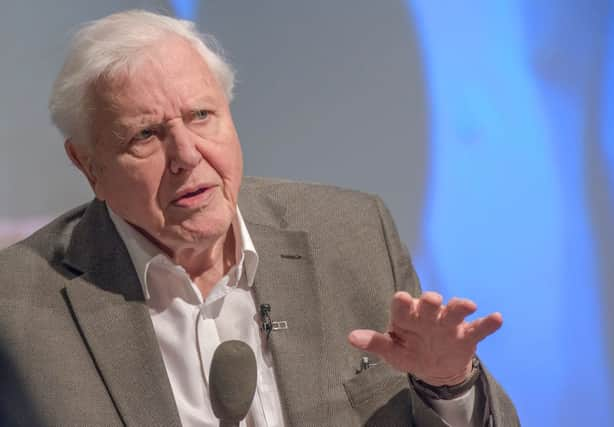Sir David Attenborough warns that G7 leaders fact some of the most important decisions in human history


G7 leaders face some of the most important decisions in human history as they tackle the climate change crisis, Sir David Attenborough said as the summit in Cornwall draws to a close.
The environmentalist will address leaders gathered in Carbis Bay on the final day of the summit as they set out plans to reverse biodiversity loss and to fund infrastructure development around the world.
Advertisement
Hide AdAdvertisement
Hide AdBoris Johnson is also launching a £500 million “blue planet fund” to protect the world’s oceans and marine life.
‘We are on the verge of destabilising the planet’
In the main business on the final day of the summit, the leaders of the G7 – the UK, US, Canada, Japan, France, Germany and Italy – will make a series of environmental commitments in Carbis Bay.
Sir David will deliver a pre-recorded message to the G7, plus guests Australia, India, South Korea and South Africa, at a session on climate and nature.
In advance of the session, he said: “The natural world today is greatly diminished. That is undeniable.
Advertisement
Hide AdAdvertisement
Hide Ad“Our climate is warming fast. That is beyond doubt. Our societies and nations are unequal and that is sadly plain to see.
“But the question science forces us to address specifically in 2021 is whether as a result of these intertwined facts we are on the verge of destabilising the entire planet?
“If that is so, then the decisions we make this decade – in particular the decisions made by the most economically advanced nations – are the most important in human history.”
Mixed in with the environmental intentions of the G7 is an attempt to reassert the values of the world’s leading democracies.
Advertisement
Hide AdAdvertisement
Hide AdThe “build back better for the world” plan will bring together G7 countries to develop an offer for high quality financing for vital infrastructure, from railways in Africa to wind farms in Asia.
The move is part of an attempt to counter Beijing’s “belt and road” initiative which has spread Chinese influence around the globe.
The new approach is intended to give developing countries access to more, better and faster finance, while accelerating the global shift to renewable energy and sustainable technology.
Mr Johnson said: “Protecting our planet is the most important thing we as leaders can do for our people.
Advertisement
Hide AdAdvertisement
Hide Ad“There is a direct relationship between reducing emissions, restoring nature, creating jobs and ensuring long-term economic growth.
“As democratic nations we have a responsibility to help developing countries reap the benefits of clean growth through a fair and transparent system.”
Pledge to reduce emissions by over half
G7 nations are expected to commit to almost halve their emissions by 2030 relative to 2010. The UK has already pledged to cut emissions by at least 68% by 2030 on 1990 levels, the equivalent to a 58% reduction on 2010 levels.
The countries will set out the action they will take to slash carbon emissions, including measures like ending all unabated coal use as soon as possible, halting almost all direct government support for the fossil fuel energy sector overseas and phasing out petrol and diesel cars.
Advertisement
Hide AdAdvertisement
Hide AdThe G7 will also endorse a nature compact, aimed at halting and reversing biodiversity loss by 2030 – including supporting the global target to conserve or protect at least 30% of land and oceans by the end of the decade.
Mr Johnson has also launched the UK’s blue planet fund, with £500 million to help countries including Ghana, Indonesia and Pacific island states tackle unsustainable fishing, protect and restore coastal ecosystems like mangroves and coral reefs, and reduce marine pollution.
The fund will run for at least five years.